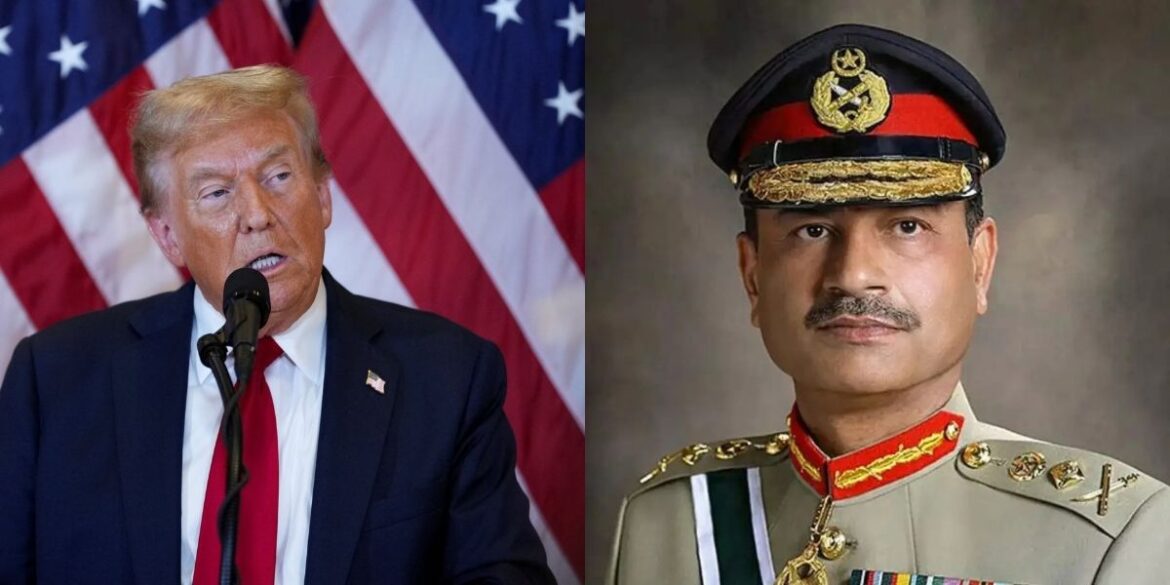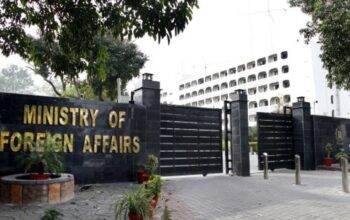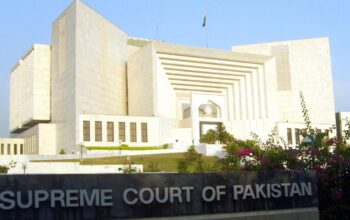By Staff Reporter
ISLAMABAD: President Donald Trump welcomed Pakistan’s Chief of Army Staff, Field Marshal Syed Asim Munir, to the White House on Wednesday for a landmark meeting focused on joint counterterrorism efforts and expanding bilateral trade, a high-level engagement that stretched beyond its scheduled hour to over two.
The talks, described as “cordial” by Pakistan’s military, marked the first time a serving Pakistani army chief has met face-to-face with a sitting US president, signaling a deepening of ties amid a volatile regional landscape.
The meeting began with a luncheon in the Cabinet Room and continued in the Oval Office, attended by Secretary of State Marco Rubio and Special Representative for Middle Eastern Affairs Steve Witkoff from the US side. Munir was accompanied by Pakistan’s National Security Advisor, Lt. Gen. Muhammad Asim Malik, who also serves as the country’s intelligence chief.
The formal reception underscored the significance of the occasion, the first time a Pakistani military leader has been received at this level without holding political office or governing under martial law.
Trump “lauded Pakistan’s ongoing efforts for regional peace and stability, and appreciated the robust counterterrorism cooperation between the two states,” a statement from Pakistan’s military media wing, the Inter-Services Public Relations (ISPR), said. “Both sides reaffirmed their commitment to continued collaboration in the field of counter-terrorism.”
ISPR said Air Marshal Munir “conveyed the deep appreciation of the government and people of Pakistan for President Trump’s constructive and result-oriented role in facilitating a ceasefire between Pakistan and India in the recent regional crisis”. “The COAS acknowledged President Trump’s statesmanship and his ability to comprehend and address the multifaceted challenges faced by the global community.”
Both leaders reaffirmed their commitment to continued collaboration in counterterrorism, a pillar of US-Pakistan relations for decades.
But the discussions ranged far beyond security. “Discussions also encompassed avenues for expanding bilateral cooperation in multiple domains, including trade, economic development, mines and minerals, artificial intelligence, energy, cryptocurrency, and emerging technologies,” the ISPR said. Trump expressed “keen interest in forging a mutually beneficial trade partnership with Pakistan based on long-term strategic convergence and shared interests.”
The president also praised Munir’s “leadership and decisiveness during a period of complex regional dynamics,” a nod to the Pakistani commander’s role in navigating recent tensions with India and the broader fallout from the escalating Israel-Iran conflict.
Munir, recently elevated to Field Marshal for his “strategic brilliance” during deadly clashes with India in May, extended an invitation to Trump to visit Pakistan “at a mutually convenient date.”
The leaders also turned their attention to the week-long missile exchanges between Iran and Israel, a conflict threatening to destabilize the Middle East and beyond. “A detailed exchange of views also took place on the prevailing tensions between Iran and Israel, with both leaders emphasising the importance of resolution of the conflict,” the ISPR said.
Pakistan, which shares a border with Iran, has repeatedly called for de-escalation while balancing ties with Tehran, Gulf allies, and its sympathy for the Palestinian cause amid Israel’s ongoing offensive in Gaza.
After the meeting, Trump told reporters he was “honored” to host Munir and confirmed that the Iran-Israel crisis had been a topic of discussion. He also thanked the Pakistani commander for “preventing the standoff with India from escalating further,” a reference to the ceasefire Munir credited to Trump’s intervention.
The White House talks reflect the outsized role of Pakistan’s powerful military in shaping the country’s foreign and security policies. Direct engagement with Munir, rather than civilian leaders, underscores Washington’s pragmatic approach to managing a slate of regional challenges: the Taliban’s takeover in Afghanistan, lingering tensions with India after last month’s military exchanges, and the spiraling Israel-Iran confrontation.
Security analysts see the meeting as part of a US effort to counter China’s growing influence in South Asia, where Beijing has deepened its footprint through infrastructure investments and defense ties with Islamabad. The discussions on trade and technology, areas typically handled by civilian governments, also highlight the Pakistani military’s expanding reach into economic and financial management.
Bodies like the Special Investment Facilitation Council (SIFC), a civil-military platform overseeing major economic initiatives, have become central to Pakistan’s economic agenda, and Munir’s talks with Trump on these issues signal the army’s growing clout.
Copyright © 2021 Independent Pakistan | All rights reserved




